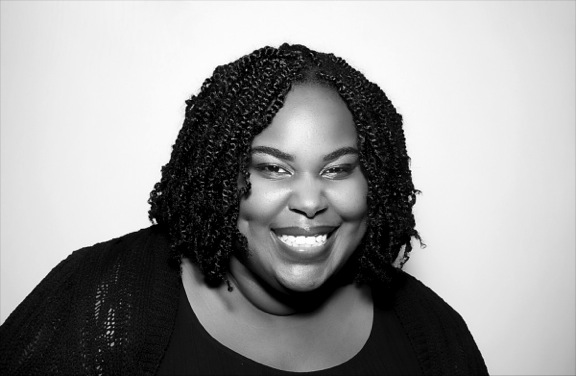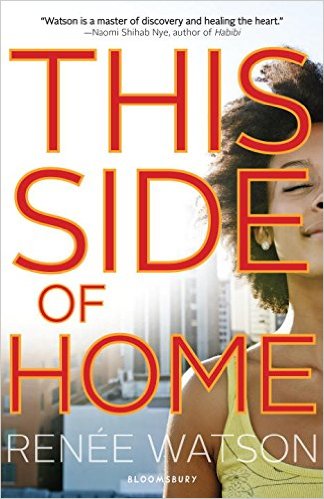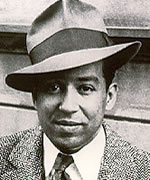It’s always a pleasure to feature award-winning author Renée Watson. Her powerful books include This Side of Home, Harlem’s Little Blackbird, A Place Where Hurricanes Happen, What  Momma Left Me and the forthcoming Piecing Me Together. Today, we’re honored to share another side of her – visionary and advocate.
Momma Left Me and the forthcoming Piecing Me Together. Today, we’re honored to share another side of her – visionary and advocate.
Renée’s dream is to lease and renovate the Harlem brownstone where Langston Hughes lived and transform it into a place for emerging and established artists. She has launched a crowd-funding campaign to help. Please spread the word and give if you can. There are lots of cool perks for donating including signed books – among the gems is a basket of books by members of our team – critiques and skip-the-slush pile passes, Skype author visits and more. By donating, you can help Renée give back to the community, preserve and build on Langston’s legacy and celebrate the arts.
Below, she writes about her inspiring mission. You can also see her and other artists talk about why the project matters in the I, Too, Arts Collective video here. Thank you for your support.
Guest Post by Renée Watson
In This Side of Home everything for Maya Younger is changing. The neighborhood she’s always called home is morphing into a place where she feels like a stranger. Abandoned storefronts are being renovated, houses are getting facelifts and new faces—white faces—are showing up more and more in her community. Maya isn’t so sure these changes are for the best but her twin, Nikki, is all for the urban renewal that’s taking place.
When I do author visits, students often ask me which twin is most like me. I cheat by  saying that I see myself in both twins. I started noticing changes in my Portland, Oregon neighborhood my junior year in high school. Gentrification was not a word I knew at fifteen but I felt the effects of it. There was a knowing, even if unspoken, that the changes being made weren’t for the people who already lived in the neighborhood but for the people who were coming. Yet, even with that feeling, I still wanted to go out and enjoy these new places. So for me, I have both of their perspectives—I want the change, appreciate it even, but I question the push out that often comes with it.
saying that I see myself in both twins. I started noticing changes in my Portland, Oregon neighborhood my junior year in high school. Gentrification was not a word I knew at fifteen but I felt the effects of it. There was a knowing, even if unspoken, that the changes being made weren’t for the people who already lived in the neighborhood but for the people who were coming. Yet, even with that feeling, I still wanted to go out and enjoy these new places. So for me, I have both of their perspectives—I want the change, appreciate it even, but I question the push out that often comes with it.
Twenty years later, the Portland I grew up in no longer exists. Of course, this isn’t a new phenomenon. And maybe that’s the problem. This happens time and time again—people of color being pushed out of their neighborhoods, losing pieces of their collective history. As I tour the nation visiting young people in schools, community organizations, and libraries, I’ve learned that gentrification is happening everywhere—Austin, DC, Boston. As an author of young adult literature, I am moved by the real-life stories from young people who see themselves in the pages of my novels. To know the circumstances my characters are going through resonate with the reader is a gratifying experience.
But there is also sadness.
Part of the problem with gentrification is that it often erases a people’s history. Places hold stories and when we lose sacred places like churches, theaters, and the homes of black legends, we lose pieces of our collective story.
That is one of the reasons I am launching I, Too, Arts Collective. Harlem, like so many other neighborhoods in America, is changing. And once again I find myself feeling like both Maya and Nikki, loving all the new trendy restaurants and coffee shops but also feeling nervous about who will be able to stay and enjoy these new places.
 I see I, Too, Arts Collective as a space that will not only preserve the legacy of Langston Hughes but build on it. Our name, is inspired by one of Langston’s poem where he declares, “I, too, am America”, and talks about taking his place at the table. It is a statement that declares, “I, too, deserve a space, a voice, to be seen.”
I see I, Too, Arts Collective as a space that will not only preserve the legacy of Langston Hughes but build on it. Our name, is inspired by one of Langston’s poem where he declares, “I, too, am America”, and talks about taking his place at the table. It is a statement that declares, “I, too, deserve a space, a voice, to be seen.”
We hope participants in our programs feel like they have a seat at the artistic table—that their existence is worthy of being showcased and remembered. Our offerings will have opportunities for beginning, emerging, and professional writers and artists to be involved. We will offer poetry workshops and creative writing courses for youth and adults. The space will also host creative conversations for the community, where guest artists (of all disciplines) will share works-in-progress and engage with the audience through discussions. One thing I am very excited about is our Artist-in-Residence program, which will be open to writers and artists across the country to apply to stay at Langston’s home so they can create and work in New York City. This is ideal for authors on a book tour, an artist who needs to be in NYC to work on a special project, or a visiting professor. Our Artist-in-Residence program will provide affordable space for visiting artists. What excites me most about this program is that it widens Langston’s home beyond New York City. Artists from the south, the west coast—even international artists—can be a part of this.
As I pursue this dream I keep at my desk a few of Langston’s poems. I have been holding on to this one, especially:
I Look at the World
I look at the world
From awakening eyes in a black face—
And this is what I see:
This fenced-off narrow space
Assigned to me.
I look then at the silly walls
Through dark eyes in a dark face—
And this is what I know:
That all these walls oppression builds
Will have to go!
I look at my own body
With eyes no longer blind—
And I see that my own hands can make
The world that’s in my mind.
Then let us hurry, comrades,
The road to find.
—Langston Hughes, 1930
I, Too, Arts Collective is committed to making; with our own hands, our own voices, the world that’s in our mind.
Renée Watson is the executive director of I, Too, Arts Collective and the author of This Side of Home (Bloomsbury 2015), which was nominated for the Best Fiction for Young Adults by the American Library Association. Her picture book, Harlem’s Little Blackbird: The Story of Florence Mills (Random House 2012), received several honors including an NAACP Image Award nomination in children’s literature. Her novel, What Momma Left Me, (Bloomsbury 2010), debuted as the New Voice for 2010 in middle grade fiction. Her one woman show, Roses are Red Women are Blue, debuted at the Lincoln Center at a showcase for emerging artists.
One of Renée’s passions is using the arts to help youth cope with trauma and discuss social issues. Her picture book, A Place Where Hurricanes Happen (Random House, 2010), is based on poetry workshops she facilitated with children in New Orleans in the wake of Hurricane Katrina and was featured on NBC Nightly News.
Renée has worked as a writer in residence for several years teaching creative writing and theater in public schools and community centers through out the nation. Her articles on teaching and arts education have been published in Rethinking Schools and Oregon English Journal. She is on the Council of Writers for the National Writing Project and is a team member of We Need Diverse Books. She currently teaches courses on writing for children at University of New Haven and Pine Manor College.
Renée has given readings and lectures at many renowned places, including the United Nations Headquarters and the Library of Congress. In 2015 she was honored with the STEAM award for her work in arts education by Inner City Foundation of New York, Inc.
Renée grew up in Portland, Oregon and currently lives in New York City. To learn more about Renée and her work, visit her at www.reneewatson.net
About I, Too, Arts Collective
I, Too, Arts Collective is a nonprofit organization committed to nurturing voices from underrepresented communities in the creative arts. Our first major project is to provide a space for emerging and established artists in Harlem to create, connect, and showcase work. Our goal is to lease and renovate the brownstone where Langston Hughes lived in Harlem as a way to not only preserve his legacy but to build on it and impact young poets and artists.
For more information & to donate, please visit us here: https://www.generosity.com/community-fundraising/i-too-arts-collective

Having read a bit more about Portland’s history and backstory since Renée Watson’s book came out, I can see that preservation is a necessary work – not just in our writing, but in a more direct and tangible way. I salute her efforts, and wish this program the best.